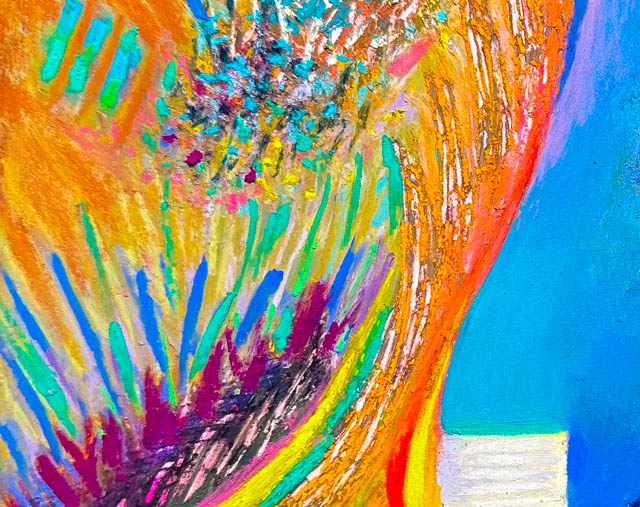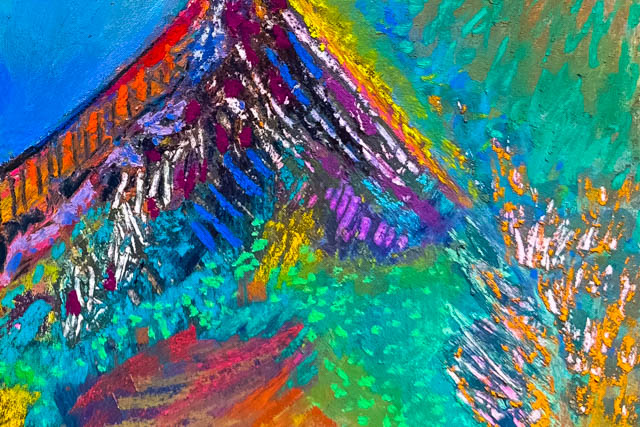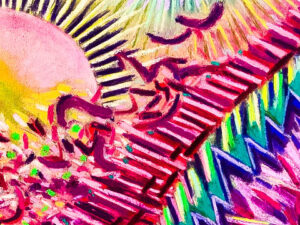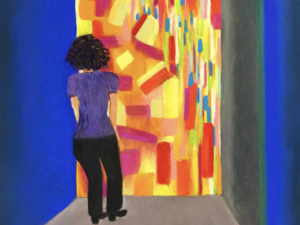“For some time, Mohan wandered the roads of India in search of a spiritual teacher. One day, he finally finds such a master with whom he stays, caring for his master’s cows during the day, studying at his feet in the evening. At the death of his master, who had a phenomenal knowledge and grasp of the holy writings of Hinduism, Mohan hit the road once more.
One day, completely famished and exhausted, he reaches a poor village whose inhabitants get him back into decent shape. Discovering his rare knowledge of the scriptures and Vedanta, they offer him permanent hospitality, as they had no Brahmin in the village.
Little by little, a small circle of disciples from the village and the surrounding areas builds up around Mohan. Among the young men following Mohan’s teaching is a teenager called Saralah, who is absolutely convinced that Mohan is the best teacher he could ever find, and who would give him the sacred mantra that would enable him to reach illumination. Mohan, however, has a very poor opinion of Saralah’s spiritual capacities.
Unbeknown to his teacher, Saralah sleeps on Mohan’s doorstep, should the master ever express some need even at night. One night, pressed by a natural need, Mohan trips over Saralah’s body.
His angry reaction is to bellow, “Always you!” And pointing to the road leading out of the village, he shouts, “Leave immediately. and don’t return before I call for you!”
However, Saralah interprets “Always You” as his holy mantra, You being the divine. Wherever he is, whomever or whatever he meets– a peasant on his cart, a wild animal on a jungle path, a terrible storm, hunger, or a good meal– his one and only response to everything is to see a divine manifestation: always “Always You.” As year adds upon year, there emanates from Saralah an amazing energy of deep serenity and contentment, of quiet joy, and an all pervading love.
One day he reaches a village where a widow has lost her only son. In the past, in India, the situation of widows was very difficult, and for a poor widow to lose her only son was a major tragedy, a real cataclysm. When Saralah arrives, the villagers are preparing to cremate the body and are running to and fro to chase the evil spirits and prevent the spirit of the deceased from returning to his body. They are afraid the boy’s spirit will not leave and will turn into a phantom and haunt the village. The villagers, sensing the profound spiritual nature of Saralah, beg him to pray for the deceased, while the bereft mother implores him to save her son.
Saralah explains that he has not the gift of appeasing the souls of the deceased nor of awakening them. ‘But I will repeatt the powerful mantra my master Mohan taught me.’ And he settles down at the foot of the pyre and plunges totally into the holy name.
And suddenly the young man sits up, astonished to find himself on a pyre, and climbs down. The stunned villagers start bringing small gifts to Saralah, which they lay at his feet. However, the latter refuses the slightest acknowledgement. ‘It is not to me that you must make these gifts, it is to my teacher Mohan.’
Without realizing it, Saralah has traveled a huge circle of thousands of miles and has come within a short distance of Mohan’s village, where he still teaches and is fairly well known in the region.
Soon after, a large crowd of people comes to tell Mohan the unbelievable story of this resurrection brought about by one of his students. But Mohan knows not a single one of his students is capable of performing such a miracle, not to mention himself. So he asks the name of the student, and the people in the crowd reply, ‘Saralah.’ Totally stunned, Mohan asks them to tell Saralah that his teacher is calling for him.
Rapidly, the villagers catch up with Saralah, who in the meantime has left the village. ‘Your master Mohan asks you to come and see him in his village.’ For Saralah, this is the great day, the day he had almost stopped hoping for, when his teacher would call him back.
When he arrives at Mohan’s modest house, he falls at his feet. Gently, Mohan raises him up and asks him what his mantra is and when he received it. Saralah narrates his version of the incident,’And then you gently rested your foot on me as I lay on your doorstep and said, ‘Always You.’
And suddenly the whole scene came back to Mohan. He remembers his profound irritation at discovering Saaralah’spresence on his doorstep, hears himself yell ‘Always you’ and order Saralah to leave the village and never eeturn until he, Mohan, calls hm back. He sees Saralah’s radiant features, feels the quiet strength and inner light that his whole being emanates compared to the old, completely desiccated and parched teacher he has become, lost on the path of his sterile intelligence, replete with a theoretical knowledge expressed in formulas and wise quotes, all in the head, nothing in the heart.
In a one-in-a-lifetime moment of deep humility, Mohan falls at the feet of Saralah and begs him, O Master, teach me.”
by Pierre Pradervand, originally told by Martine Quentric-Seguy

2 Comments
-
Wow! This is profound and seems exactly what I need at this time. Thanks.
And I appreciate your colorful paintings. They feel good. -
❤️







